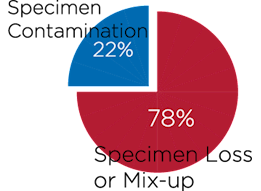READ OUR BLOG
Consider the Legal Implications of Lost Specimens
We all know losing a specimen is a problem. Lost specimens are costly for labs financially and in respect to customer relationships. But have you ever considered the legal implications of losing a specimen? Irreplaceable lost specimens can be medically detrimental to patients, and tracking samples using antiquated methods such as pen and paper allows too much room for human error. In this month’s blog we will review lab related scenarios involving human error and explain why barcode tracking through electronic systems are better for lab courier operations, patients, and referring physicians.
Based on an article published by medical malpractice insurer SVMIC, an analysis of pathology closed claims resulting in insured monetary  loss between 2007-2016 was conducted. In their findings most claims were from misread specimens, but 38% of claims were linked back to “system issues” occurring primarily in the pre-analytic phase. There were two types of systems issues resulting in monetary losses: specimen contamination (22%) and specimen loss or mix up (78%).
loss between 2007-2016 was conducted. In their findings most claims were from misread specimens, but 38% of claims were linked back to “system issues” occurring primarily in the pre-analytic phase. There were two types of systems issues resulting in monetary losses: specimen contamination (22%) and specimen loss or mix up (78%).
Of course, not all lost or mixed-up specimens will result in medical malpractice suits, but the ones that do can be costly. The SVMIC article goes on to give real world scenarios that explain what types of lab malpractice suits lead to monetary losses. Here is a synopsis of what happened along with an explanation of how MCE protects labs from scenarios such as these.
In Case #1 there was a mix-up in urology specimens between two patients that led to the wrong patient being diagnosed with prostate cancer and having a prostatectomy performed. In this scenario the lab was able to prove that everything was done by the book during the analytical phase. In the end, the fault was found to mostly be on the urology group because the lab made sufficient notes and documentation that the urologist office did not use provided lab containers and made other continual mistakes.
Labs are required to provide documentation of improper specimen submissions by providers for this very reason. Although some mistakes cannot be found until specimens make it into the lab, very often a trained courier can immediately spot mishandled specimens during pick-ups. With MCE, couriers can document any issues found with specimens directly in MCE upon pick-up. For instance:
- a specimen may not be properly sealed
- a specimen is not stored at the proper temperature
- customers use of wrong containers
These are a few examples of issues couriers can document electronically in MCE for future reference in case of legal suits, and it can also help the lab address issues with providers who have multiple offences.
Case #2 is a prime example of what MCE was initially created for. A kidney biopsy was sent to the lab, and a week later was discovered missing. There was a paper log recording the specimen being placed in a biohazard bag for transport. However, the specimen never made it to accessioning, and negligence on the lab was undisputed. The specimen was never found, and the lab covered repeated biopsy and medical costs for the patient.
With MCE, labs can avoid missing or lost specimens through the utilization of barcode tracking. Using the Honeywell CT60/CT40 mobile computer, couriers scan in a specimen bag at a customer site and then scan it out at the lab. If a specimen bag is not scanned out the courier is immediately notified and can promptly go look for the sample instead of waiting for days or weeks. Furthermore, scanning specimens in with MCE provides customers with an instant notification of what has been picked-up and in possession of the lab, and scanning the specimen out instantly lets the lab know that the specimen is ready for accessioning.
As discussed in previous blogs, missing and lost specimens usually turn into a he-said/she-said blame game (see: https://medicalcourier.com/lost-specimens/). However, in the grand scheme of things, sometimes it does not matter as much about who is to blame as it does why there were not proper systems in place to prevent errors in the first place.
Having advanced systems that reduce the likelihood of human error is always a good thing. It helps demonstrate your labs commitment to safety for customers and patients. As most labs understand there is an ongoing issue with lost and missing specimens within the healthcare industry. However, attorneys understand this just as well (see: https://whitneyfirm.com/the-hospital-lab-lost-my-biopsy-sample-what-should-i-do/). No matter what type of system you put in place for your courier operations, make sure you are doing everything in your power to protect the patient and yourself. Contact MCE today for a free web demo and a discussion about how MCE can enhance your courier operations: 877-331-7427 x101 or email us at contact@medicalcourier.com.
Sources:
https://home.svmic.com/resources/newsletters/59/an-analysis-of-pathology-closed-claims
https://whitneyfirm.com/the-hospital-lab-lost-my-biopsy-sample-what-should-i-do/
Let Us Know How We Can Help
Thanks for your interest in Medical Courier Elite! If you're interested in learning more about our solution and how it can help your business, we'd be happy to schedule a demo, provide a quote or answer any questions you may have.
181 East Evans St. | Florence, SC, 29506
Phone: 843-656-2084 or 877-331-7427
www.medicalcourier.com
contact@medicalcourier.com

Wow, awesome blog structure! How long have you been blogging for?
you make blogging look easy. The entire glance of your site
is fantastic, let alone the content! You can see similar here e-commerce